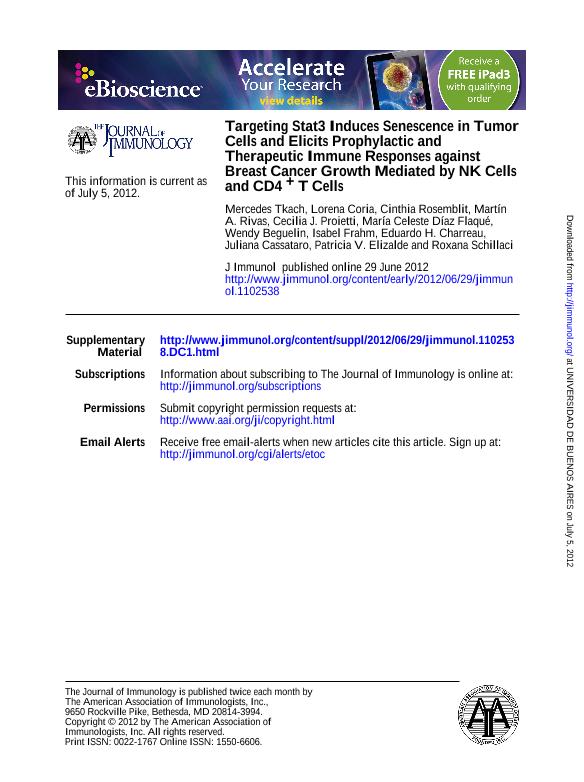Artículo
Targeting Stat3 induces senescence in tumor cells and elicits prophylactic and therapeutic immune responses against breast cancer growth mediated by NK cells and CD4 + T cells
Tkach, Mercedes ; Coria, Mirta Lorena
; Coria, Mirta Lorena ; Rosemblit, Cinthia
; Rosemblit, Cinthia ; Rivas, Martin Alfredo
; Rivas, Martin Alfredo ; Proietti Anastasi, Cecilia Jazmín
; Proietti Anastasi, Cecilia Jazmín ; Díaz Flaqué, María Celeste
; Díaz Flaqué, María Celeste ; Beguelin, Wendy
; Beguelin, Wendy ; Frahm, Isabel; Charreau, Eduardo Hernan
; Frahm, Isabel; Charreau, Eduardo Hernan ; Cassataro, Juliana
; Cassataro, Juliana ; Elizalde, Patricia Virginia
; Elizalde, Patricia Virginia ; Schillaci, Roxana
; Schillaci, Roxana
 ; Coria, Mirta Lorena
; Coria, Mirta Lorena ; Rosemblit, Cinthia
; Rosemblit, Cinthia ; Rivas, Martin Alfredo
; Rivas, Martin Alfredo ; Proietti Anastasi, Cecilia Jazmín
; Proietti Anastasi, Cecilia Jazmín ; Díaz Flaqué, María Celeste
; Díaz Flaqué, María Celeste ; Beguelin, Wendy
; Beguelin, Wendy ; Frahm, Isabel; Charreau, Eduardo Hernan
; Frahm, Isabel; Charreau, Eduardo Hernan ; Cassataro, Juliana
; Cassataro, Juliana ; Elizalde, Patricia Virginia
; Elizalde, Patricia Virginia ; Schillaci, Roxana
; Schillaci, Roxana
Fecha de publicación:
08/2012
Editorial:
American Association of Immunologists
Revista:
Journal of Immunology
ISSN:
0022-1767
Idioma:
Inglés
Tipo de recurso:
Artículo publicado
Clasificación temática:
Resumen
Aberrant Stat3 activation and signaling contribute to malignant transformation by promoting cell cycle progression, inhibiting apoptosis, and mediating tumor immune evasion. Stat3 inhibition in tumor cells induces the expression of chemokines and proinflammatory cytokines, so we proposed to apply Stat3-inhibited breast cancer cells as a source of immunogens to induce an antitumor immune response. Studies were performed in two murine breast cancer models in which Stat3 is activated: progestin-dependent C4HD cells and 4T1 cells. We immunized BALB/c mice with irradiated cancer cells previously transfected with a dominant-negative Stat3 vector (Stat3Y705F) in either a prophylactic or a therapeutic manner. Prophylactic administration of breast cancer cells transfected with Stat3Y705F (Stat3Y705F-breast cancer cells) inhibited primary tumor growth compared with administration of empty vector-transfected cells in both models. In the 4T1 model, 50% of the challenged mice were tumor free, and the incidence of metastasis decreased by 90%. In vivo assays of C4HD tumors showed that the antitumor immune response involves the participation of CD4 + T cells and cytotoxic NK cells. Therapeutic immunization with Stat3Y705F-breast cancer cells inhibited tumor growth, promoted tumor cell differentiation, and decreased metastasis. Furthermore, inhibition of Stat3 activation in breast cancer cells induced cellular senescence, contributing to their immunogenic phenotype. In this work, we provide preclinical proof of concept that ablating Stat3 signaling in breast cancer cells results in an effective immunotherapy against breast cancer growth and metastasis. Moreover, our findings showing that Stat3 inactivation results in induction of a cellular senescence program disclose a potential mechanism for immunotherapy research. Copyright © 2012 by The American Association of Immunologists, Inc.
Palabras clave:
Stat3
,
Breast Tumor
,
Nk Cells
Archivos asociados
Licencia
Identificadores
Colecciones
Articulos(INIGEM)
Articulos de INSTITUTO DE INMUNOLOGIA, GENETICA Y METABOLISMO
Articulos de INSTITUTO DE INMUNOLOGIA, GENETICA Y METABOLISMO
Citación
Tkach, Mercedes; Coria, Mirta Lorena; Rosemblit, Cinthia; Rivas, Martin Alfredo; Proietti Anastasi, Cecilia Jazmín; et al.; Targeting Stat3 induces senescence in tumor cells and elicits prophylactic and therapeutic immune responses against breast cancer growth mediated by NK cells and CD4 + T cells; American Association of Immunologists; Journal of Immunology; 189; 3; 8-2012; 1162-1172
Compartir
Altmétricas



